Text
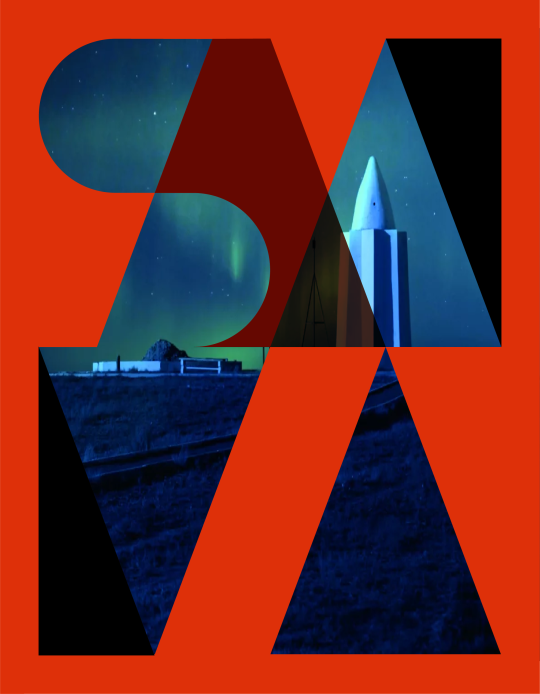
We are pleased to announce our podcast ‘Left to be Desired’ is now live. In episode 2 of Left to be Desired, Maja and Reuben Fowkes converse with Uzbek artist Saodat Ismailova about the turbulent legacies of the Soviet transformation of Central Asia.
Left to be Desired is available to listen to on Spotify, Amazon Music/Audible, Apple Podcasts and Audacy. You can also access it via the podcast website: https://lefttobedesired.libsyn.com/site
Left to be Desired podcast explores the distinctiveness of the socialist path through the Anthropocene by bringing together artistic and scholarly insights into the ecologies of global Socialism. Maja & Reuben Fowkes will invite artists and researchers to talk about their practice and exchange ideas at the intersection of ecology, climate change, art and the Socialist Anthropocene.
Saodat Ismailova grew up in post-Soviet Uzbekistan and is now based in Tashkent and Paris. Ismailova’s filmography addresses themes of national memory, women’s sovereignty, ritualism and mortality. In 2021 she founded Davra a research group devoted to the study, documentation and dissemination of Central Asian culture. In 2022 her work was selected for both the Venice Biennale and Documenta.
Thank you to Saodat Ismailova for joining us!
This podcast is edited by Sammara Abbasi.
#lefttobedesired#socilaistanthropocene#saodatismailova#podcast#art#soviet#climatechange#envhum#art history
0 notes
Text

We are pleased to announce our podcast ‘Left to be Desired’ is now live. In episode 1 of Left to be Desired, Maja and Reuben Fowkes talk to Austrian artist Oliver Ressler about his recent work around extractivism and explore connections with socialist geographies.
Left to be Desired is available to listen to on Apple Podcasts, Spotify, Amazon Music/Audible and Audacy. You can also access it via the podcast website: https://lefttobedesired.libsyn.com/site
Left to be Desired podcast explores the distinctiveness of the socialist path through the Anthropocene by bringing together artistic and scholarly insights into the ecologies of global Socialism. Maja & Reuben Fowkes will invite artists and researchers to talk about their practice and exchange ideas at the intersection of ecology, climate change, art and the Socialist Anthropocene.
Oliver Ressler is an artist and filmmaker who produces installations, projects in public space, and films on issues such as economics, democracy, migration, the climate crisis, forms of resistance and social alternatives. Since 2019 Ressler directs Barricading the Ice Sheets, a research project on the climate justice movement, funded by the Austrian Science Fund, that lead to an exhibition at Camera Austria in Graz in September 2021. Barricading the Ice Sheets is currently on view at The Showroom
Socialist Anthropocene in the Visual Arts (SAVA) is the first large-scale interdisciplinary research project that institutes the Socialist Anthropocene as a new field of study within the critical corpus concerned with challenging and decentring the West-centric discourses of the Anthropocene, asserting the constitutive role of the twentieth century environmental histories of Socialism in the formation of the new geological age. It is led by Maja and Reuben Fowkes, who are art historians, curators and co-directors of the Postsocialist Art Centre (PACT) at Institute of Advanced Studies, University College London.
This podcast is edited by Sammara Abbasi.
#lefttobedesired#oliverressler#podcast#socialistanthropocene#artists#art history#anthropocene#envhum#art podcast#socialism
0 notes
Text
Left to be Desired

We are thrilled to announce the launch of our new podcast ‘Left to be Desired’. Maja & Reuben Fowkes will invite artists and researchers to talk about their practice and exchange ideas at the intersection of ecology, climate change, art and the Socialist Anthropocene. We hope this podcast will help you engage further in these themes and with artists’ works.
#art history#anthropocene#LefttobeDesired#podcast#new#artpodcast#artist#envhum#ecology#climatechange#socialistanthropocene#socialism
0 notes
Text
Anca Benera & Arnold Estefán. Rehearsals for Peace. Jun 10, 2023 – Aug 6, 2023. At n.b.k Berlin.
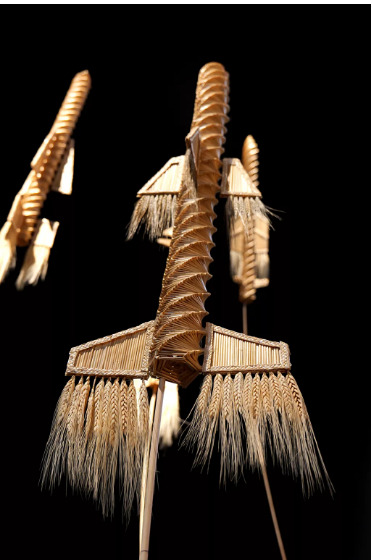

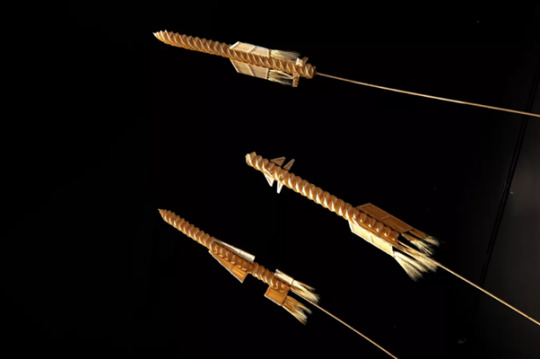
SAVA Creative Fellows and artists Anca Benera and Arnold Estefan will have their exhibition ‘Rehearsals for Peace’ at n.b.k Berlin.
Opening on 9th June, it is their first ever solo exhibition in Germany. It explores the absurdities of warfare and the militarization of nature and examines the paradoxical dynamics between military readiness, simulated operations, and the desire for peace. The artists’ recent research focuses on ecological issues such as extractivism, which is also our project’s annual research theme, and the overexploitation of natural resources.
The video Rehearsals for Peace (2023) – co-produced by the n.b.k. Video-Forum – draws on various folk traditions for warding off evil spirits. Rehearsals for Peace will be shown for the first time, as part of a site-specific installation and together with Perpetual Harvest (2023), a series of woven straw sculptures that recall an ancient harvest ritual accompanying the seasonal rhythm of wheat cultivation.
Curated by Krisztina Hunya and Diana Marincu, the exhibition is viewable from 10th June to 6th August, 2023 at n.b.k Berlin.
Link: n.b.k. – Anca Benera & Arnold Estefán (nbk.org)
Anca Benera & Arnold Estefán, Perpetual Harvest, 2023, installation, 6 objects (woven wheat straw, in collaboration with the artisan Angéla Fazakas), 90 x 15 x 15 cm each. Photo © Anca Benera & Arnold Estefan.
#neuerberlinerkunstverein#nbkberlin#ancabenera#arnoldestefan#beneraestefan#artinberlin#utopia#debrissphere#kunstinberlin#art#berlin#SAVA#PACT#artist#militarytraining#nato#transylvania#ecosystems#rituals#evilspirits#urzelnlaufen#resistance#perpetualharvest#peace
0 notes
Text
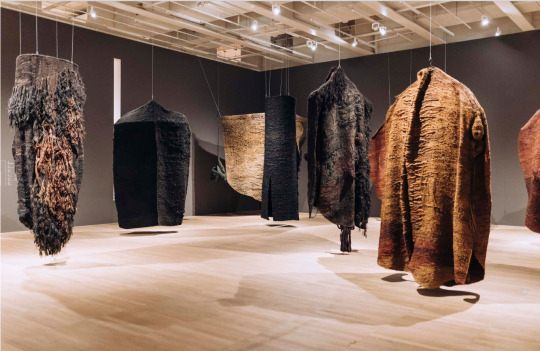

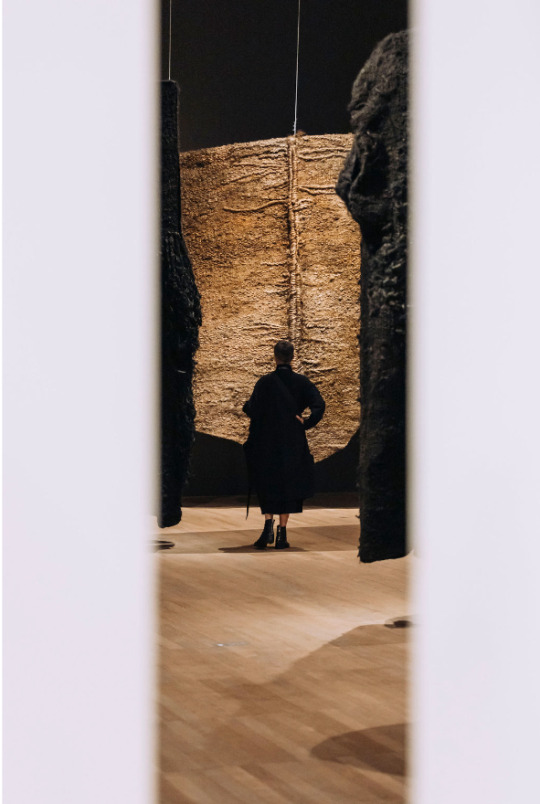
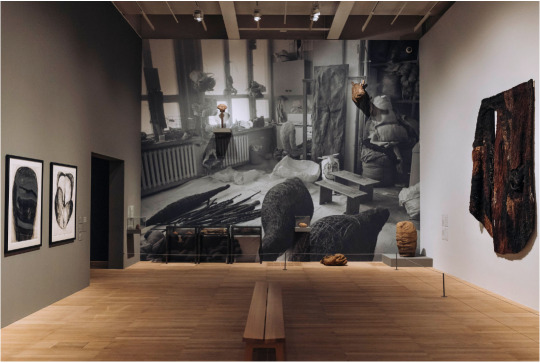
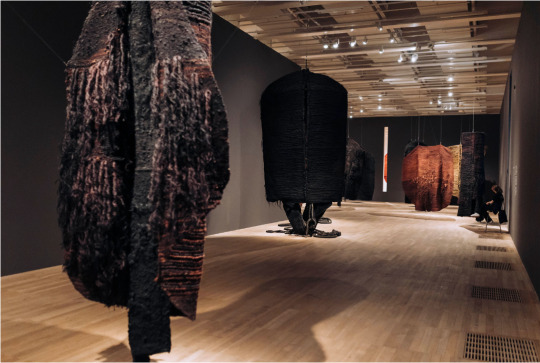

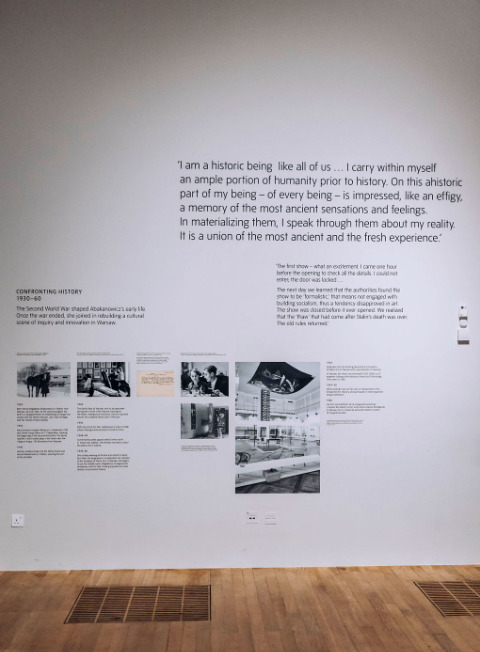
'Magdalena Abakanowicz: Every Tangle of Thread and Rope' exhibition at Tate Modern, London.
Photography: : Harry Pseftoudis
0 notes
Text
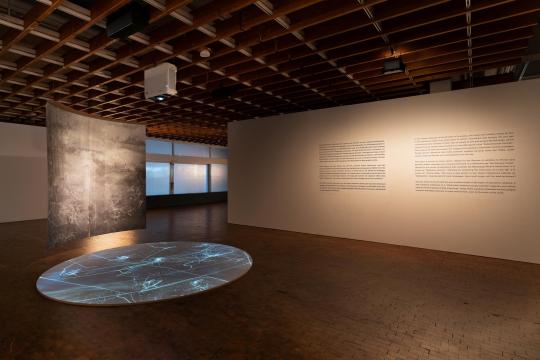
Imani Jacqueline Brown
What remains at the ends of the earth?, 2022.
Installation view. photo: dotgain.info
0 notes
Text

Malala Andrialavidrazana
Figures 1856, Geological structure, 2018.
1 note
·
View note
Text
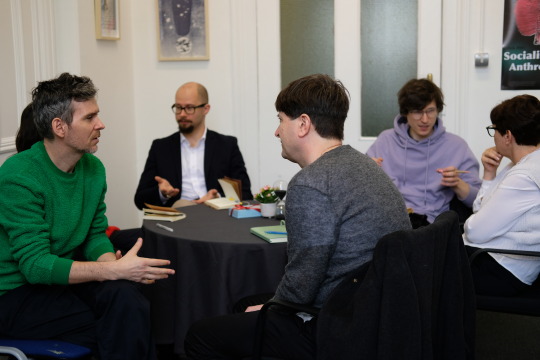

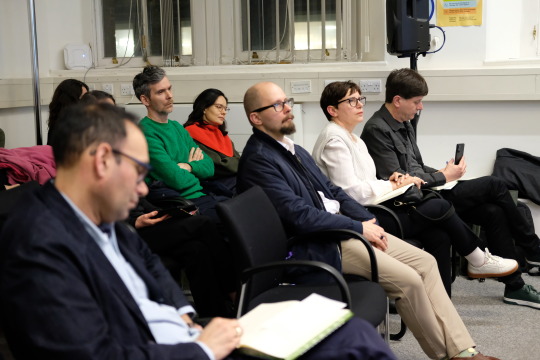


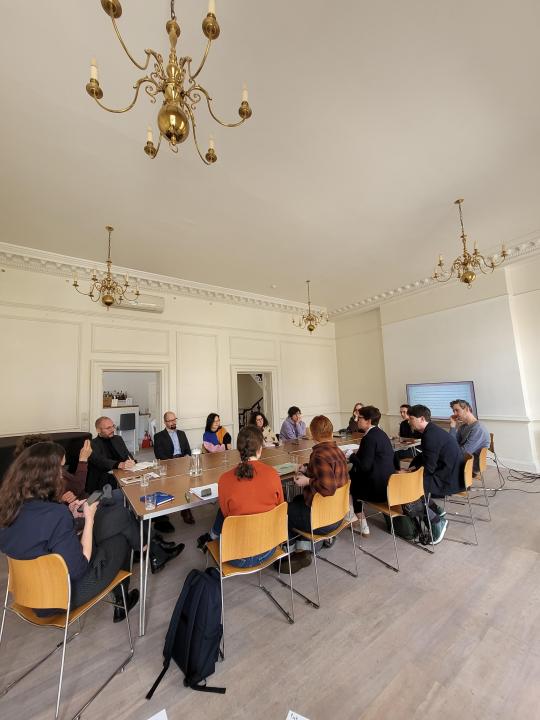

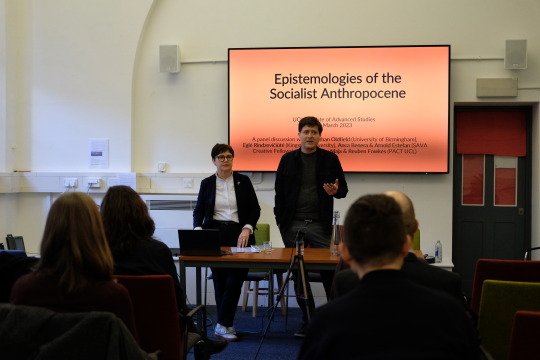
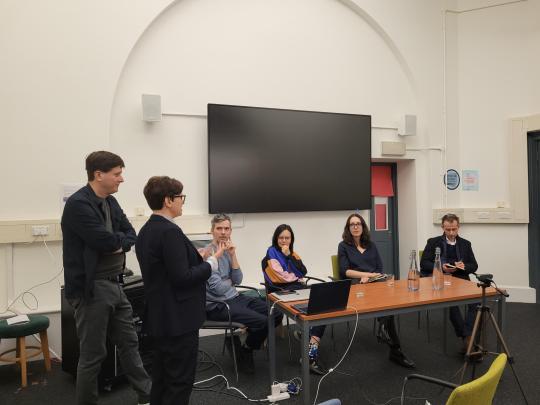
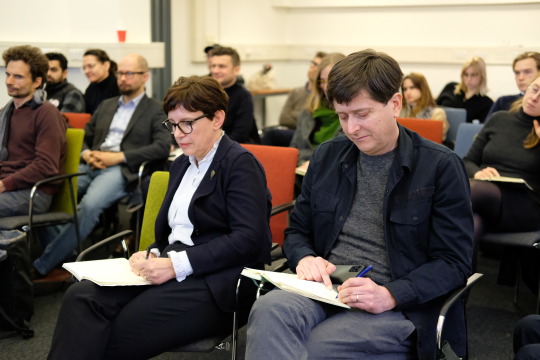
The inaugural Research Week of Socialist Anthropocene in the Visual Arts began on March 13th, 2023. Artists, researchers and scholars with cross-disciplinary approaches presented their work in both public events and closed discussions. We thank all those who joined us and made this a productive and thought-provoking research week!
0 notes
Text
For the Rights of the Soil not to be Exhausted: Ecocentric Practices for Land Restoration
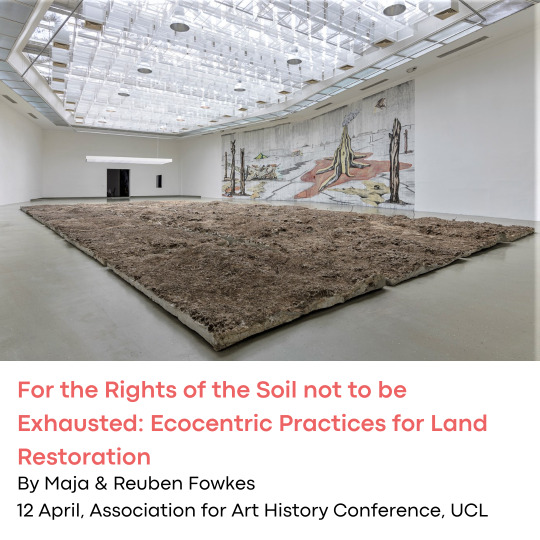
Co-Directors of the Postsocialist Art Centre (PACT) Maja and Reuben Fowkes will be presenting ‘For the Rights of the Soil not to be Exhausted: Ecocentric Practices for Land Restoration’ on April 12th as part of the ‘Matter Matters: The Aesthetics and Politics of Soil’ panel at the 49th Annual Association for Art History Conference, taking place at University College London.
About the Presentation:
As climate breakdown tests the ecological limits of heavy agriculture, how have artists exposed the entwined colonial and environmental histories of land and proposed ecocentric practices based on more-than-human comradeship and care? These questions are addressed through Anetta Mona Chişa’s One Are (2021), which translated the Roman unit of territory into a 100m2 inverted cast of a ploughed field to reveal the materiality of the soil in its earthy imprint of tilling, cracking and erosion. Also considered is Cooking Sections’ For the Rights of the Soil not to be Exhausted (2019), which engaged with the histories of chernozem from the Ukrainian steppe, from the terror of Soviet grain requisitioning to the impact of shifting climatic zones. The artist duo also collaborated with lawyers to legally enshrine the defence of the soil against capitalist extractivism, encapsulating the planetary tipping point in attitudes towards what anthropologist Kristina Lyons calls the “complex self-organising system” underground.
Image: Anetta Mona Chişa, One Are (2021)
#socialistanthropocene#arthistory#envhum#annualconference#forarthistory2023#research#art history#UCL#land reform#ecocentrism#ecostructure#soil#enviornment
0 notes
Text
Socialist Anthropocene: Artistic Perspectives on the Great Transformation of Nature
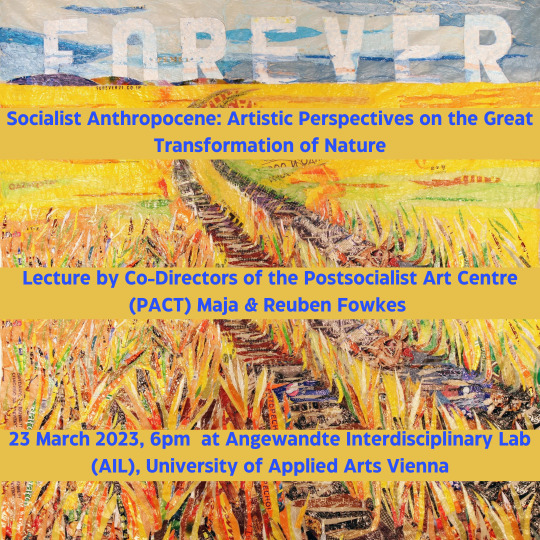
Co-Directors of the Postsocialist Art Centre (PACT) Maja and Reuben Fowkes to give a guest lecture on the Socialist Anthropocene at the Angewandte Interdisciplinary Lab (AIL), University of Applied Arts Vienna on 23 March 2023, 6pm.
The Socialist Anthropocene denotes the version of the Anthropocene that unfolded on the socialist side of the Cold War divide, the particular histories of which have been side-lined in the west-centric and universalizing narrative of the new geological age. Its entwined social and environmental histories are illuminated in the art and visual culture of the socialist world, not least in depictions of the vast project of infrastructural, agricultural and geoengineered interventions into the natural environment decreed in the Stalin Plan for the Great Transformation of Nature of 1948. This presentation will consider the distinctiveness of the Socialist Anthropocene, including outlining the tension between the modernizing and colonizing tendencies of socialist transformation, especially in relation to the histories of expansion into the indigenous territories of the Soviet North and South. Furthermore, it will address the alternative epistemologies of socialist science, grounded in the understanding of the Earth as an interconnected ecological system and manifest in Soviet advances in climate science since the 1960s. To what extent can then the Socialist Anthropocene be approached as a potential source of ecological models and practices to confront the planetary crisis of climate change?
Image Used: Saule Suleimenova, One Steppe Forward, 2019. Courtesy the artist.
#art history#art#research#Angewandte Interdisciplinary Lab (AIL)#social history#envhum#UCL#socialist anthropocene#anthropocene#vienna#Saule Suleimenova#University of Applied Arts Vienna
0 notes
Text
Epistemologies of the Socialist Anthropocene

‘Epistemologies of the Socialist Anthropocene’ will explore attitudes and approaches to the natural world under socialism, focusing on the divergent histories of Soviet science, the corrosive legacies of nuclear culture and planetary impacts of militarism.
Jonathan Oldfield Professor in Russian Environmental Studies and Head of Geography, Earth and Environmental Sciences at the University of Birmingham. He will discuss Soviet scientist Vladimir Vernadsky’s understanding of the biosphere and related concept of the noösphere as the sphere of human thought.
Eglė Rindzevičiūtė is an Associate Professor of Criminology and Sociology at Kingston University London. Her publications include 'The Power of Systems: How Policy Sciences Opened Up the Cold War World' (2016). She will consider the ways in which the Soviet nuclear military-industrial complex is materially preserved, critically reassessed and mythologised as cultural heritage.
SAVA Creative Fellows Anca Benera and Arnold Estefan are Bucharest and Vienna based artists and have collaborated since 2012. Their research-driven art practice examines hidden patterns in historical, social, and geopolitical narratives through installation, video, and performance. Their project for the Socialist Anthropocene, "Prospecting S.A.", explores the Romanian-African joint economic ventures and their legacies since the first Romanian trans-African expedition. They will present their project on the Debrisphere, a term they coined to denote the layer of the planet that is transformed by military intervention into aquatic and terrestrial landscapes.
Link: SAVA: Epistemologies of the Socialist Anthropocene | Institute of Advanced Studies (IAS) - UCL – University College London
Photo: Anca Benera & Arnold Estefan, 'Debrisphere, Landscape as an extension of the military imagination', 2017.
#art history#research#social history#environment#environmental justice#socialism#postsocialism#anthropocene#socialist anthropocene#soviet russia#romania#eastern europe#envhum#UCL#london#discourse
0 notes
Text
Jonas Staal: 94 Million Years of Collectivism Event

Join us on the 13th for a guest lecture and screening of 94 Million Years of Collectivism by artist Jonas Staal for the first SAVA Research Week, with responses by John Sabapathy and Anna Barcz. Moderated by Dr. Maja and Reuben Fowkes: https://www.ucl.ac.uk/institute-of-advanced-studies/events/2023/mar/jonas-staal-94-million-years-collectivism
Socialist Anthropocene in the Visual Arts (SAVA) sets out to radically transform current critical debates around the Anthropocene, addressing the major lacuna in existing accounts by establishing the Socialist Anthropocene as a conceptual framework that asserts the constitutive role of the environmental histories and potentialities of Socialism in the formation of the new geological age. The project is led by Dr. Maja Fowkes (UCL Institute of Advanced Studies) and funded by UK Research and Innovation (UKRI) under the UK government’s Horizon Europe funding guarantee.
Image: Jonas Staal, 94 Million Years of Collectivism (2022). Courtesy the artist.
#art history#event#london#UCL#socialism#artist#lecture#Jonas Staal#SAVA#Socialist Anthropocene in the Visual Arts#anthropocene#socialistanthropocene
2 notes
·
View notes